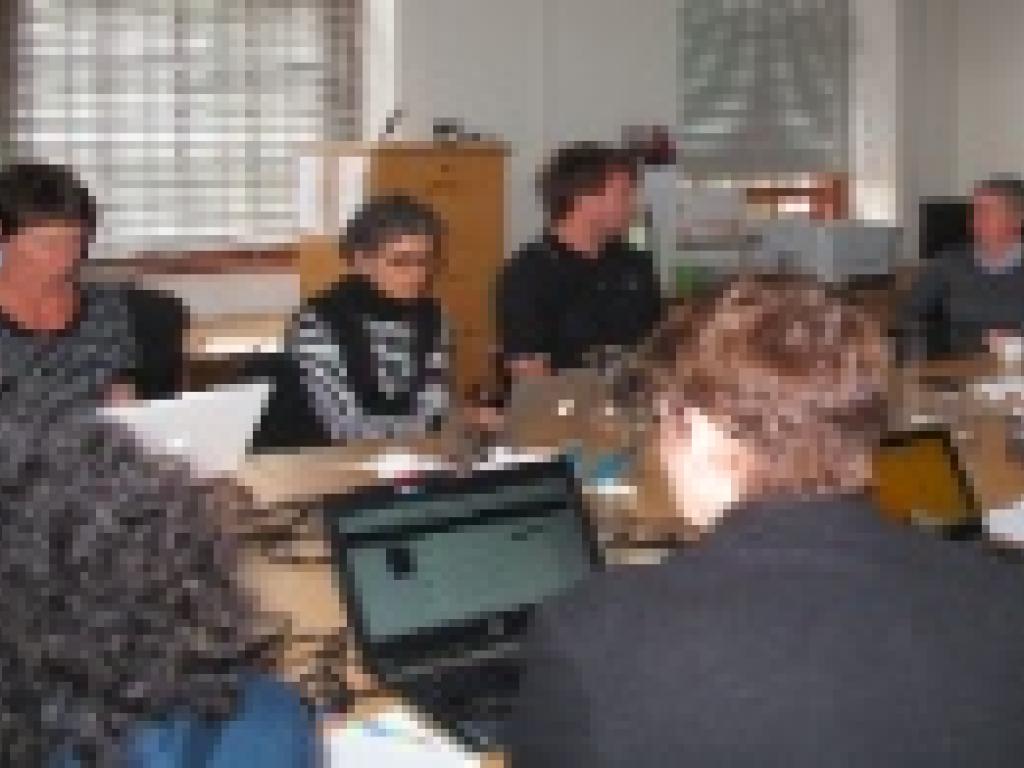Omeka: New Technologies and Strategies in Digital History

Participants in the Cape Town Omeka workshop held in the APC’s Jon Berndt Thought Space.
The Five Hundred Year Archive (FHYA) is a project of the Archive and Public Culture Research Initiative (APC) that aims to develop and promote understandings of the archival possibilities of materials located both within and outside of formal archives, and to facilitate their engagement. It does this in order to stimulate interest, research and enquiries into the southern African past before European colonialism.
Omeka as a Content Management System
One of the outputs of the project will be the FHYA Exemplar, a multi-institutional, cross-disciplinary digital archive. A core concern in the development of the exemplar is the choice of a content management system (CMS) that has the necessary functionality to support both the project’s conceptual underpinnings and technical requirements. Omeka is a free, flexible, and open source web-publishing platform for the display of library, museum, archives, scholarly collections and exhibitions, developed at the Roy Rosenzweig Center for History and New Media (RRCHNM) in Fairfax, Virginia, U.S.A.
APC Senior Researcher, Mbongiseni Buthelezi and Post-doctoral Research Fellow, Grant McNulty, identified Omeka as a potential solution for the FHYA Exemplar. They applied for, and received, a Knowledge, Interchange and Collaboration grant from the National Research Foundation to bring Sharon Leon, the Director of Public Projects at the RRCHNM, to South Africa to work with the FHYA core team to consult on developing the exemplar.
Sharon’s visit also provided a unique opportunity to introduce digitisation and the management of digital collections to smaller cultural institutions in South Africa where a lack of funding, skills and relevant management systems pose significant barriers.
Omeka Workshops
Two workshops were held in Johannesburg and Cape Town. The first took place at WISER (the Wits Institute for Social and Economic Research) on the 3rd September 2015 and was co-hosted by the WISER and the South African Digitisation Initiative. The workshop introduced Omeka to 34 participants (mainly academics, researchers, curators, librarians and archivists) from Wits University, the University of Johannesburg, the National Research Foundation and the Gauteng provincial government.
The Cape Town workshop, hosted by the APC, was held on 7 September at the University of Cape Town. Attendees came from a variety of institutional backgrounds, including museums (District Six, Iziko, Solms-Delta and Stellenbosch University museums), the Tombouctou Manuscripts Project, the University of Cape Town, the Desmond and Leah Tutu Foundation and Heritage Western Cape.
The workshops comprised two sessions, with the first focusing on digital public history and the second a practical session in which participants registered their own Omeka accounts and used the CMS. Below are the details of these sessions.
Engagement and Access in Digital Public History
The work of public history calls for taking good history scholarship into the world to meet the needs and interests of a non-academic audience. While much of that work has traditionally happened in face-to-face encounters and at physical sites, public historians increasingly encounter their audiences through digital means such as social media, blogs, exhibit sites, collection and archives sites, mobile applications, and digital simulations.
The possibilities for doing sophisticated digital public history work have expanded significantly since the first cultural heritage organisations began to create web presences in the mid-1990s. At the same time, the core elements and challenges of doing rigorous public history work have not changed very much. As a result, the best digital public history work requires a blend of applied technical skills, targeted engagement strategies and content knowledge.
This session offered a formulation of support structures, tools, and frameworks to support the creation of user-centred digital public history work in small organisations. It introduced the concept of user-centred digital public history, and then offered an outline of support materials for planning (research, strategy, and infrastructure creation), executing (building digital collections, creating rich interpretive content, and creating engaged communities around that work), and sustaining (frequent evaluation, ongoing outreach campaigns, and attention to issues of digital preservation) digital public history projects.
Taking the Next Steps with your Omeka Project
Omeka takes a user-centred, access-focused approach to collections, emphasising approachable, accessible web design and community features. As a result, a wide range of institutions adopting Omeka include the State Archives of Florida, the Newberry Library, the Smithsonian Institution, the Rockefeller Foundation, the University of California, Berkeley, and many college and university libraries (see the Omeka showcase for examples).
This session introduced participants to the basic elements of Omeka’s infrastructure: items, collections, plugins, and themes. From there, participants learnt how to publish their collections, and build interpretive websites that leverage contextual metadata, item relationships, and geospatial data. Participants also explored methods to engage visitors through a number of approaches, including social media, commenting, community sourced contributions and transcriptions.